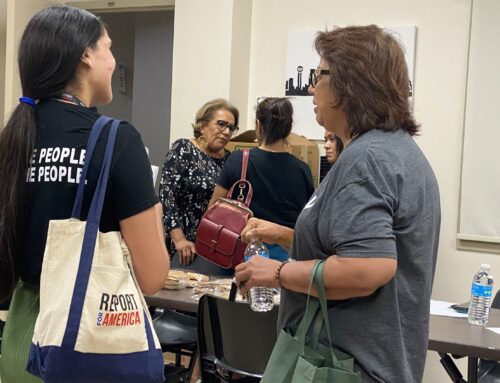New racial equity leader appointed to guide Dallas ISD efforts
Co-published by our media partner, the Dallas Weekly
Two years into its existence, Dallas ISD’s racial equity office has a new leader, Sharon Quinn.
She replaces Leslie Williams, whom Supt. Michael Hinojosa appointed to lead the office in 2018 when it was created. Quinn moved to back to Texas from South Carolina in 2017 to join Dallas ISD as a deputy chief of school leadership, overseeing student education at half the district’s campuses.
Quinn was one of 15 DISD department heads part of a resource equity working group this past school year “to look at how we could promote an equity mindset — where we stood and where we wanted to go,” she explains on a recent phone call. The committee made its report to the board of trustees in June, not long after trustees voted to approve a Black Lives Matter resolution in response to the death of George Floyd in police custody that sparked a wave protests across the country, including Dallas.
Soon afterward, Quinn says she was approached to “lead the racial equity office around the findings of this report.”
“It was work that was critical in our district,” Quinn says.

So after Williams moved to a new role as deputy chief of special projects, Quinn took over the office charged with “relentlessly pursue[ing] systemic improvements to policies, programs, and practices that eliminate inequities.”
Her appointment comes at a crucial time. The COVID-19 pandemic is exacerbating the educational disparities that exist between white, Black and Latino students, and exposing the racial fault lines that continue to plague us as both a nation and a city.
And though trustees approved the racial equity resolution in 2017, community leaders serving on the council tasked with advising the racial equity office say DISD hasn’t yet made good on its promises.
“We need the district to recommit, to double down following what’s happened with Black Lives Matter,” says Amber Sims, a council member and one of the original advocates for a racial equity office in DISD. “We’re still waiting for a racial equity audit.”
Racial equity vs. cultural competency
In his final report to the board as deputy chief of racial equity, Leslie Williams highlighted six accomplishments over the 2019-20 school year. Two of the most notable were new African-American and Mexican-American studies courses at 90% of DISD high schools, including Lincoln, Madison and Pinkston; and hiring the Michigan-based Cultural Intelligence Center to develop employees’ “capability in terms of working with diverse families and populations.”
DISD paid the Cultural Intelligence Center roughly $150,000 over the course of 14 months to analyze the district’s cultural intelligence in areas such as knowledge, strategy and action, and to train DISD employees on cultural intelligence and unconscious bias.
The goal was to create “100 trainers of trainers,” Quinn says, who can go into schools and various DISD departments to “provide people with tools, terminology and approaches to be not only empathetic but sensitive to what you say and how you say it. It matters to the person you’re speaking with.”
Sims argues, however, that a cultural intelligence analysis and a racial equity audit are two different things.
“That’s not racial equity work,” she says. “Every day we’re not talking about race and we’re talking about proxy words, we’re not getting to the heart of the issue.”
DISD has one of the largest racial equity offices in the state, says Sims, who was appointed to the advisory council by District 9 Trustee Justin Henry, who represents South Dallas. She points out that the office’s very name, which denotes the district’s decision to explicitly focus on “race-based systems we have to dismantle,” sets it apart from other school districts’ “diversity, equity and inclusion” or “cultural competency” efforts.
In June 2019, DISD hired Massachusetts-based Education Resource Strategies to “conduct an equity resource map that helps Dallas ISD understand whether it’s using its resources equitably to support student success.” That consultant and the resource equity working group Quinn was part of presented its 172-page report to the board in June 2020, and that report is “the foundation and the driver of our work now,” she says.
“We tried to have metrics before,” Quinn says. “Part of the reason for consulting with an outside firm — you know how sometimes you cannot see the forest for the trees? It’s good to have someone come in from the outside and probe and prod.”
“How are we keeping our word and have a way of measuring our success?”
Sharon Quinn, Dallas ISD deputy chief of racial equity
The report’s “10 big ideas,” each connected to the racial equity policy’s seven pillars, Quinn says, give DISD a way “to progress monitor what we say we’re going to do, offer the board a starting benchmark but give ourselves some goals along the way to expand our progress.” The report allows the district to “come together as a team to solve our own problems,” she says, and answer the question:
“How are we keeping our word and have a way of measuring our success?”
The promise of racial equity
DISD’s financial commitment to racial equity came in conjunction with the 2018 tax ratification election. The district asked voters to increase the tax rate by 13 cents, costing the average DISD homeowner an extra $240 a year. Voters approved the tax increase, and the result was $126 million more annually that the district could use to support four initiatives: early learning, schools of choice, strategic compensation and racial equity.
Last year DISD spent nearly $7 million on racial equity; this year the budget is $4.575 million.
Community members who are part of the district’s racial equity advisory council say they don’t understand how the budget and polices are translating to resources and services.
“There’s no budget, no structure, none of that,” says Toni Johnson, appointed to the council by District 5 Trustee Maxie Johnson (no relation). “I had meetings with Leslie Williams, and I asked him, what was the structure? If I got an issue with discrimination from a teacher to a student, who do I call? I couldn’t get an answer.”
“That’s how I came to the conclusion that the office don’t exist; it’s just there to be seen,” she says.
Trustee Johnson’s District 5, which includes Pinkston and other West Dallas schools, has an active D5 Coalition which has pressed the district for more community representation and involvement in the racial equity office. The initial advisory council included only nine appointees from each of the nine trustees, and they didn’t necessarily live in the communities their trustees represented. So the D5 Coalition successfully made the case that DISD should open the council to additional community members.
Council member Nancy Tien, part of the D5 Coalition, was one of the 16 who applied and was selected. She’s a founder of Dallas CORE (Communities Organizing to Reach Equity) and says her years as a DISD teacher familiarized her with the racial inequities the district perpetuates.
When she joined the council in fall 2019, Tien says she “didn’t see much focus on research or proven ways to reduce racial equity at a systemic level.”
The council was asked to make policy suggestions, and “I was kind of surprised,” Tien says. “I thought we would get to be briefed on different programs and ideas, but that never really happened.”
When the council asked for data — suspensions of Black students vs. other races, staff demographics, contracts with women and minorities — it took months, if the data was provided at all, Tien says.
“Busy work” is how Toni Johnson describes the work the council was asked to do. District staff asked them for help in bridging the gap between the community and district, and in changing the way the community sees the district — “stuff that they should have been doing,” she says.
Meanwhile, the resource equity working group — the one Quinn sat on, with top-level DISD staff and select community members — had access to the data and the discussions in which the advisory council had hoped to be included, members say.
When Williams left his post and Quinn was appointed, the council wasn’t notified; they heard it through the grapevine.
“We have great community members who are really interested in this work, and investing and walking alongside the district to do this work,” Sims says. “It’s important with this new shift in leadership to see these groups included — not just given information, but help shape the direction the office is going to take.”
“The community wants to see racial equity. That much is owed to the Black and Brown populations of Dallas.”
Nancy Tien of Dallas CORE, racial equity advisory council community member
How to track progress toward equity
Advisory council members say the district needs ample, transparent data available on some sort of dashboard that community members can easily see and track.
For example, the racial equity office’s June report highlighted progress toward a more equitable magnet school application process and a decrease in out-of-school suspensions across all races. A dashboard could show magnet applicants and enrollees this year vs. previous years, and analyze suspensions by race and campus year over year to determine whether a decrease correlates to efforts or simply to shrinking enrollment.
“The community wants to see racial equity,” Tien says, “That much is owed to the Black and Brown populations of Dallas.”
A dashboard should also track staff hiring and retention, including promotions and appointments to high-level positions, council members say.
“I know Dr. Quinn really well, and I know some awesome things she’s done since she’s been here. She takes care of her business,” Toni Johnson says. “However, she’s not from Dallas. She doesn’t have the grassroots here. She doesn’t know our areas and the things we have dealt with in this city.
“You have several people around the city who deal with racial equity — why not post the job?”
Trustee Johnson and the other two Black DISD trustees, Henry and Joyce Foreman, met with Supt. Hinojosa this summer and made several demands in light of the Black Lives Matter resolution, including that the deputy chief of racial equity should instead be a chief who is part of the superintendent’s cabinet. That request hasn’t been granted.
“Dr. Quinn don’t have a seat at that table, so whatever she decides to do has to go through somebody else,” Johnson says.
‘We can measure what we do’
A month into the job, Quinn says she views her office as “a connector with all of the other departments.” Racial equity can’t be relegated to a single office because each decision made across all departments impacts equity, she explains.
Quinn says the goal is an “equity lens and thread running through every department” rather than “creating racial equity and giving it out.”
“Other departments produce a product; ours is more of a mindset, a conscious way of thinking and operating,” Quinn says. “We’re holding them true — I don’t even want to say accountable — to what we say as a district.”
Quinn named three front-and-center priorities in terms of data, based on the Education Resource Strategies report:
- Tracking out-of-school suspensions and “providing support to address why student behavior is the way it is instead of what the behavior is,” she says. The district’s approved 2020-21 budget includes $5.8 million to hire an additional 57 mental health clinicians, and “schools with the most out-of-school suspensions will receive more of a psychologist than a social worker to get to the root of the problems for students,” Quinn says.
- Identifying students placed in special education courses by ethnicity, as students of color are “overrepresented in special education programming while being underrepresented in rigorous classes including Advanced Placement, honors and gifted and talented programming,”according to the Black Lives Matter resolution.
- Incentivizing teachers to work at 80 “high-priority campuses” identified by struggling academics and following the data to know whether those teachers impacted student performance.
A data analyst will be part of her restructured team in order to make the work “a little more granular, so people can see this is not just jargon — there is action behind it. We can measure what we do,” Quinn says.
Every department and division backed up the report, she says, with chiefs at the table committing to do the work.
Sims describes the Education Resource Strategies report as “action steps, not systemic changes.”
“The district owes it to the community to be giving annual reports, but the work has to go deeper,” Sims says.
She’s excited about Quinn’s leadership “because I do think we will see a shift,” Sims says.
Quinn will meet in September with the advisory council and several DISD department heads. She says community members’ feedback is crucial to “make us aware of different problems to solve and issues to address.”
“We need them to help us actualize the work,” Quinn says. “Just like we need the departments, we need the community.”
On Aug. 13, Dallas ISD trustees voted to put a $3.7 billion bond package on the Nov. 3 election ballot. The package includes $40 million to “address racial equity by creating family resource centers in four historically redlined neighborhoods,” including South Dallas and West Dallas. Virtual meetings for the Lincoln and H. Grady Spruce high school community were held over the summer, and the results will be presented soon to the board of trustees. Pinkston and Roosevelt high schools’ virtual community meetings begin the week of Sept. 7. Dallas Free Press will be following the progress. Send questions to keri@dallasfreepress.com and visit dallasisd.org/resourcecenters for more information.
Share This Story, Choose Your Platform!
Keri Mitchell has spent 20+ years as a community journalist, including 15 years dedicated to community and civic journalism at Dallas’ Advocate magazines. She launched Dallas Free Press in early 2020 with the belief that all neighborhoods deserve reporting and storytelling that values their community and holds leaders accountable.
Mitchell says she is energized by “knowing our work is making an impact — listening to people, telling their stories with strong narratives paired with compelling data that leads to change. I also love spending time in our neighborhoods and with our neighbors, learning from them and working to determine how journalism can be part of the solution to their challenges.”
Mitchell is proud to be the winner of multiple awards during her journalism career including: Finalist in Magazine Feature Reporting (2018) and Finalist in Magazine Investigative Reporting (2017) from Hugh Aynesworth Excellence in Journalism, Best Feature Story (2011) from Texas Community Newspaper Association and Best Magazine Feature (2011) from Dallas Bar Association Philbin Awards.
Areas of Expertise:
local government, education, civic issues, investigative and enterprise reporting
Location Expertise:
Dallas, Texas
Official Title:
Founder + executive director
Email Address:
keri@dallasfreepress.com





